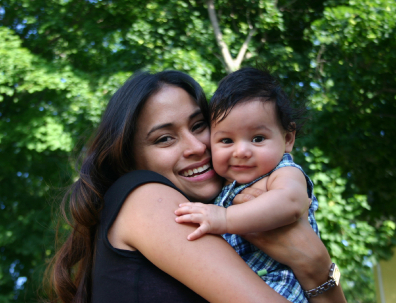Our Vision
We envision a future where every child with special needs in our community is embraced, empowered, and given the opportunity to thrive. Through early identification, compassionate support, and strong partnerships with families, we strive to build a community where inclusion, respect, and understanding are the foundation for every child’s success.
About Our Program
The White Earth Early Intervention & Early Childhood Special Education (ECSE) Program offers comprehensive child and family centered intervention services for children between the ages of birth and 6 years old. Services are provided by the Bureau of Indian Education and the State based on the needs and preferences outlined by the individualized goals and objectives of children with special needs and their families. These individualized plans are developed by a special team including the child's family.
For children under three years of age and their families, these plans are called individualized family Service Plan (IFSP). Children of this age are most often seen in their home.
For children three to six years of age, these plans are called Individualized Education Plan (IEP). These children are most often seen in the Head Start setting. The White Earth Early Intervention & ECSE Program provides many services for children between the ages of birth and six.
Make a Referral
If you have concerns about your child’s development, you can refer your child for a developmental screening or evaluation. Early childhood professionals will contact you to discuss your concerns and arrange for a screening or evaluation, if needed.
CLICK HERE TO ACCESS THE REFERRAL.
More About Early Intervention
What is Early Intervention?
Broadly speaking, early intervention services are specialized health, educational, and therapeutic services designed to meet the needs of infants, toddlers, and preschoolers from birth through age five, who have a developmental delay or disability. Services can also be provided to children birth through age two who are considered to be at-risk of developing substantial delays if services are not provided.
The process begins when someone (parent, family member, childcare provider, doctor) makes a referral for an initial evaluation. Parents, family members, doctors, hospitals, public health nurses, or childcare providers—all can refer a child to early intervention programs.

Next, someone from the early intervention program makes contact to discuss concerns. Based on the information provided, a decision will be made to either do a full evaluation or begin with a screening. Parents must give permission in writing before the team can proceed with an evaluation. The initial evaluation of a child is required by IDEA (Individuals with Disabilities Education Act) before any special education and related services can be provided to that child.
An evaluation team uses a variety of assessment tools and strategies to gather relevant functional, developmental, and academic information about the child, including information provided by the parent. Evaluations examine all areas of a child’s functioning to determine not only if the child is a child with a disability, but also determine the child’s educational needs and guide decision-making about appropriate educational programming for the child. This full and individual evaluation includes evaluating the child’s:
- Health
- Vision and hearing
- Social and emotional skills
- General intelligence
- Academic Performance
- Communicative skills
- Motor abilities
- Self-help skills
Who is Eligible for Services?
PART-C Services: Birth-2
Under the IDEA, infants and toddlers with disabilities are defined as children from birth through age two who need early intervention services because they are experiencing developmental delays, as measured by appropriate diagnostic instruments and procedures, in one or more of the following areas:
- Cognitive Development
- Physical development, including vision and hearing
- Communication development
- Social or emotional development
- Adaptive development (self-help skills); or
- Have a diagnosed physical or mental condition that has a high probability of resulting in developmental delay.
PART-B Services: Children 3-21
Children ages 3 through 5 that have been identified by appropriate diagnostic instruments and procedures to have a disability as defined by one of the categories listed below are eligible for preschool services:
- Autism spectrum disorders
- Blind-visually impaired
- Deaf-blind
- Deaf and hard of hearing
- Developmental cognitive disabilities
- Developmental delay
- Emotional or behavioral disorders
- Other health disabilities
- Physically impaired
- Severely multiply impaired
- Specific learning disabilities
- Speech or language impairments
- Traumatic Brain Injury
Developmental Milestones
Babies & children develop at their own pace, so it's impossible to tell exactly when yours will learn a given skill. The Developmental Milestone Checklist will give you a general idea of the changes you can expect as your child gets older, but don't be alarmed if your child takes a slightly different course. Click here for referral information!
Developmental Milestones Helpful Links
https://helpmegrowmn.org/HMG/DevelopMilestone/index.html

